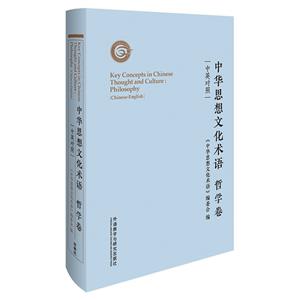-
>
考研英語背單詞20個詞根詞綴
-
>
西班牙語詞根寶典
-
>
美國K-12原版語文課本--初中·下(全12冊)
-
>
流浪地球劉慈欣
-
>
西南聯大英文課 輕讀禮盒版
-
>
英語大書蟲世界經典名譯典藏書系:中國人的精神 (英漢對照)(精選權威版本)
-
>
許淵沖譯唐詩三百首:漢文·英語
中華思想文化術語(哲學卷中英對照)(精) 版權信息
- ISBN:9787521325447
- 條形碼:9787521325447 ; 978-7-5213-2544-7
- 裝幀:一般純質紙
- 冊數:暫無
- 重量:暫無
- 所屬分類:>
中華思想文化術語(哲學卷中英對照)(精) 本書特色
適讀人群 :高中及以上中華思想文化術語是中華優秀傳統文化的思想精粹。準確表達中華思想核心概念,推進中華思想文化術語傳播,是維護文化主權、增強文化自信、促進文化交流的重要途徑。 《中華思想文化術語:哲學卷(中英對照)》收錄322條哲學類中華傳統思想文化核心詞;中英雙語對照,釋義正本清源,譯文專業權威;是理解傳統文化、閱讀文史經典、學術典籍翻譯、對外漢語教學的**之書。
中華思想文化術語(哲學卷中英對照)(精) 內容簡介
本書收錄了322條哲學類的中華思想文化術語,以中英文雙語的方式進行闡釋。這些術語反映了中國傳統文化特征和民族思維方式,體現了中國核心價值,編寫者用易于口頭表達、交流的簡練語言客觀準確地予以詮釋,目的是在政府機構、社會組織、傳播媒體等對外交往活動中,傳播好中國聲音,講好中國故事,讓世界更多了解中國國情、歷史和文化。
中華思想文化術語(哲學卷中英對照)(精) 目錄
1 ānpín-lèdào 安貧樂道
Be Content with a Simple but Virtuous Life ………… 1
2 bāɡuà 八卦
Eight Trigrams ………… 2
3 bāyīn-kèxié 八音克諧
Harmonious Combination of Eight Sounds ………… 3
4 báimǎ féi mǎ 白馬非馬
A White Horse Is Not a Horse. ………… 5
5 bǎomín 保民
Protect the People ………… 6
6 bàofǎ-chǔshì 抱法處勢
Upholding Law by Means of Power ………… 7
7 běnmò 本末
Ben and Mo (The Fundamental and the Incidental) ………… 8
8 běnwú 本無
Benwu (Original Non-being) ………… 10
9 biànhuà 變化
Change ………… 11
10 biémíng 別名
Distinct Name ………… 12
11 bōrě 般若
Prajna / Wisdom ………… 13
12 bóshī-jìzhòng 博施濟眾
Deliver Extensive Benefits to the People and Relieve the Suffering of the Poor ………… 14
13 bù’èr 不二
Advaya / Non-duality ………… 15
14 bùyánzhījiào 不言之教
Influence Others Without Preaching ………… 16
15 bùzhēnkōng 不真空
Emptiness as Non-substantiality ………… 17
16 cái 才
Talent / Capability / Attribute ………… 18
17 cānyàn 參驗
Cross-checking and Verification ………… 20
18 cháng 常
Constant Laws of Nature ………… 21
19 chēngqíng-lìwén 稱情立文
Establish Moral Standards in Keeping with Human Feelings ………… 22
20 chéngrén 成人
Complete Man ………… 23
……
141 qì 氣
Qi (Vital Force) ………… 174
142 qìzhìzhīxìng 氣質之性
Character Endowed by Qi (Vital Force) ………… 176
143 qì 器
Qi (Vessel) ………… 177
144 qiánshí 前識
Foreknowledge / Prophecy ………… 178
145 qián 乾
Qian ………… 179
146 qīnqīn 親親
Affection for One’s Kin ………… 180
147 qīnzhī 親知
Knowledge from Personal Experience ………… 182
148 qíng 情
Qing ………… 182
149 qiónglǐ-jìnxìng 窮理盡性
Explore the Nature of All Things ………… 184
150 qióng zé biàn, biàn zé tōng, tōng zé jiǔ 窮則變,變則通,通則久
Extreme – Change – Continuity ………… 185
151 qiú fànɡxīn 求放心
Search for the Lost Heart ………… 186
152 rénfùtiānshù 人副天數
Humanity Should Be Aligned with Nature. ………… 187
153 rénlún 人倫
Human Relations ………… 189
154 rénxīn 人心
Human Heart / Human Desires ………… 190
155 rén 仁
Ren (Benevolence) ………… 192
156 rénzhèng 仁政
Benevolent Governance ………… 193
157 rúláizàng 如來藏
Tathāgatagarbha / Womb of the Tathāgata ………… 194
158 sānbiǎo 三表
Three Standards ………… 196
159 sāncái 三才
Three Elements ………… 197
160 sānjiè 三界
Traidhātuka / Three Realms of Existence ………… 199
……
301 zé 則
Rules ………… 367
302 zhèn 震
Zhen (Vibration) ………… 369
303 zhènɡmínɡ 正名
Rectification of Names ………… 370
304 zhènɡxīn 正心
Rectify One’s Heart / Mind ………… 371
305 zhīxínɡ 知行
Knowledge and Application ………… 372
306 zhīxínɡ-héyī 知行合一
Unity of Knowledge and Action ………… 374
307 zhīxiān-xínɡhòu 知先行后
First Knowledge, Then Action ………… 375
308 zhí 直
Rectitude ………… 377
309 zhìmínzhīchǎn 制民之產
Sustaining the People’s Livelihood ………… 378
310 zhì 智
Intelligence ………… 379
311 zhōngdào 中道
The Middle Way ………… 381
312 zhōnghé 中和
Balanced Harmony ………… 382
313 zhōngyōng 中庸
Zhongyong (Golden Mean) ………… 384
314 zhōnɡ 忠
Loyalty ………… 385
315 zhūzǐ-bǎijiā 諸子百家
A Hundred Schools of Thought ………… 386
316 zhūzǐxué 諸子學
Study of A Hundred Schools of Thought ………… 387
317 Zhuāng Zhōu mèng dié 莊周夢蝶
Zhuangzi Dreaming of Becoming a Butterfly ………… 388
318 zìrán 自然
Naturalness ………… 390
319 zìshēng 自生
Spontaneous Generation ………… 391
320 zōngjiào 宗教
Buddhist Teachings / Religious Sect ………… 392
321 zūn déxìng 尊德性
Revere One’s Virtuous Nature ………… 393
322 zuòwàng 坐忘
Forget the Difference and Opposition Between Self and the Universe ………… 394
附錄 Appendices
中國歷史年代簡表 A Brief Chronology of Chinese History ………… 396
人名索引 Index of Names ………… 398
著作名索引 Index of Cited Works ………… 400
術語條目筆畫索引 Concepts Listed in Order of Number of Strokes ………… 405
中華思想文化術語(哲學卷中英對照)(精) 節選
天人合一/tiānrén-héyī/ Heaven and Man Are United as One. 一種認為天地人相通的世界觀和思維方式。這種世界觀旨在強調天地和人之間的整體性和內在聯系,突出了天對于人或人事的根源性意義,表現了人在與天的聯系中尋求生命、秩序與價值基礎的努力。“天人合一”在歷史上有不同的表現方式,如天人同類、同氣或者同理等。如孟子(前372 ?— 前289)認為通過心的反思可以知性、知天,強調心、性和天之間的統一。宋儒尋求天理、人性和人心之間的相通。老子則主張“人法地,地法天,天法道”。根據對天和人理解的不同,“天人合一”也會具有不同的意義。 The term represents a world outlook and a way of thinking which hold that heaven and earth and man are interconnected. This world outlook emphasizes the integration and inherent relationship between heaven, earth, and man. It highlights the fundamental significance of nature to man or human affairs, and describes the endeavor made by man to pursue life, order, and values through interaction with nature. The term has different ways of expression in history, such as heaven and man are of the same category, sharing the same vital energy, or sharing the same principles. Mencius (372?-289 BC), for one, believed that through mental reflection one could gain understanding of human nature and heaven, emphasizing the unity of mind, human nature, and heaven. Confucian scholars of the Song Dynasty sought to connect the principles of heaven, human nature, and the human mind. Laozi maintained that “man’s law is earthly, earth’s law is natural, and heaven’s law is Dao.” Depending on a different understanding of heaven and man, the term may have different meanings. 引例 Citations: ◎以類合之,天人一也。(董仲舒《春秋繁露·陰陽義》) (以事類相合來看,天與人是一體的。) In terms of integration of categories, heaven and man are one. (Dong Zhongshu: Luxuriant Gems of The Spring and Autumn Annals) ◎儒者則因明致誠,因誠致明,故天人合一,致學而可以成圣,得天而未始遺人。(張載《正蒙·乾稱》) (儒者則由明察人倫而通達天理之誠,由通達天理之誠而洞明世事,因此天與人相合為一,通過學習而可以成為圣人,把握天理而不曾遺失對人倫的洞察。) A Confucian scholar is sincere because of his understanding, and he achieves understanding because of his sincerity. That is why heaven and man are united as one. One can become a sage through studies, and master heaven’s law without losing understanding of man’s law. (Zhang Zai: Enlightenment Through Confucian Teachings)
中華思想文化術語(哲學卷中英對照)(精) 作者簡介
《中華思想文化術語》編委會由韓震等人組成。 韓震,北京師范大學學術委員會主任、教授。 袁濟喜,中國人民大學國學院教授,中國人民大學孔子研究院學術委員,北京大學美學與美育研究中心客座教授。 王博,北京大學副校長、教授,北京大學儒學研究院院長、道家研究中心主任。 聶長順,武漢大學中國傳統文化中心教授、日本研究中心學術企劃部部長。 黃友義,曾任國際翻譯家聯盟副主席、外文局副局長兼總編輯、中國翻譯協會秘書長,現任中國翻譯協會副會長、全國翻譯資格(水平)考試英語專家委員會主任。
- >
月亮與六便士
- >
名家帶你讀魯迅:朝花夕拾
- >
李白與唐代文化
- >
苦雨齋序跋文-周作人自編集
- >
中國歷史的瞬間
- >
羅庸西南聯大授課錄
- >
月亮虎
- >
羅曼·羅蘭讀書隨筆-精裝
















